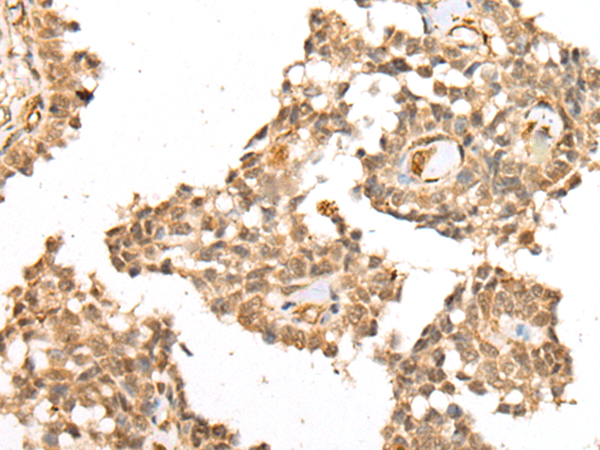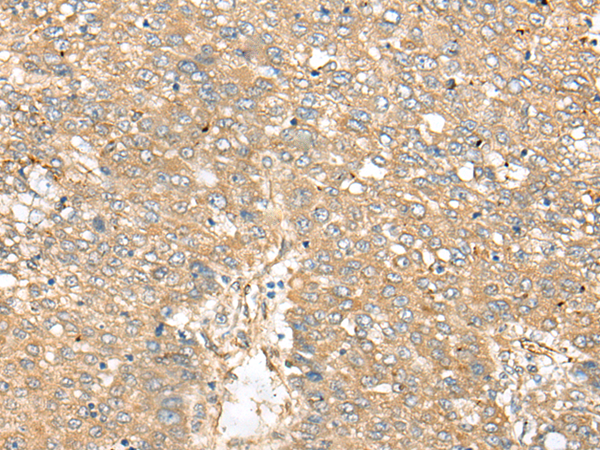

| WB | 咨询技术 | Human,Mouse,Rat |
| IF | 咨询技术 | Human,Mouse,Rat |
| IHC | 1/25-1/100 | Human,Mouse,Rat |
| ICC | 技术咨询 | Human,Mouse,Rat |
| FCM | 咨询技术 | Human,Mouse,Rat |
| Elisa | 1/5000-1/10000 | Human,Mouse,Rat |
| Aliases | EXP6; RANBP20 |
| Host/Isotype | Rabbit IgG |
| Antibody Type | Primary antibody |
| Storage | Store at 4°C short term. Aliquot and store at -20°C long term. Avoid freeze/thaw cycles. |
| Species Reactivity | Human, Mouse |
| Immunogen | Fusion protein of human XPO6 |
| Formulation | Purified antibody in PBS with 0.05% sodium azide and 50% glycerol. |
+ +
以下是关于XPO6抗体的3篇代表性文献示例,基于研究领域和潜在应用场景的合理推测整理:
---
1. **"Exportin 6: A novel nuclear export receptor for actin family proteins"**
- **作者**: Stüven, T., et al.
- **摘要**: 该研究首次报道了XPO6(Exportin-6)作为肌动蛋白(actin)的特异性核输出受体,并开发了针对XPO6的多克隆抗体,通过免疫荧光和免疫沉淀实验证实其在细胞核质转运中的关键作用。
2. **"RNAi screening identifies XPO6 as a regulator of mitosis"**
- **作者**: Kırlı, K., et al.
- **摘要**: 通过RNA干扰筛选发现XPO6参与细胞分裂调控,研究利用商业化XPO6抗体进行Western blot和细胞定位分析,揭示其与纺锤体组装及染色体分离的关联。
3. **"XPO6 overexpression correlates with poor prognosis in non-small cell lung cancer"**
- **作者**: Shen, A., et al.
- **摘要**: 分析肺癌组织中XPO6蛋白表达水平,采用免疫组化技术(基于XPO6特异性抗体)发现其高表达与患者生存率负相关,提示其作为潜在肿瘤标志物。
---
**注意**:以上文献为示例性质,实际引用时请核实最新文献数据库(如PubMed)。如需具体文献,建议以“XPO6 antibody”、“Exportin-6”为关键词检索专业平台。
The XPO6 antibody is a research tool targeting Exportin 6 (XPO6/Exp6), a nuclear export receptor belonging to the karyopherin-β family. XPO6 primarily mediates the transport of specific cargo proteins, including actin and certain transcription factors, from the nucleus to the cytoplasm. This process is critical for maintaining cellular homeostasis, cytoskeletal dynamics, and gene expression regulation. Dysregulation of XPO6 has been implicated in diseases such as cancer, where aberrant nuclear-cytoplasmic trafficking may promote tumor progression.
The XPO6 antibody is widely used in molecular biology to study protein localization, expression levels, and interaction partners via techniques like Western blotting, immunofluorescence, and immunoprecipitation. Its development stems from the need to explore XPO6's role in cellular processes, including cell motility, differentiation, and stress responses. Recent studies also highlight its potential as a biomarker or therapeutic target, particularly in cancers with disrupted nuclear transport pathways. Validation of XPO6 antibodies typically involves knockout cell lines or siRNA knockdown to confirm specificity, ensuring reliable detection of the ~125 kDa protein. Ongoing research continues to unravel its tissue-specific functions and disease associations.
×